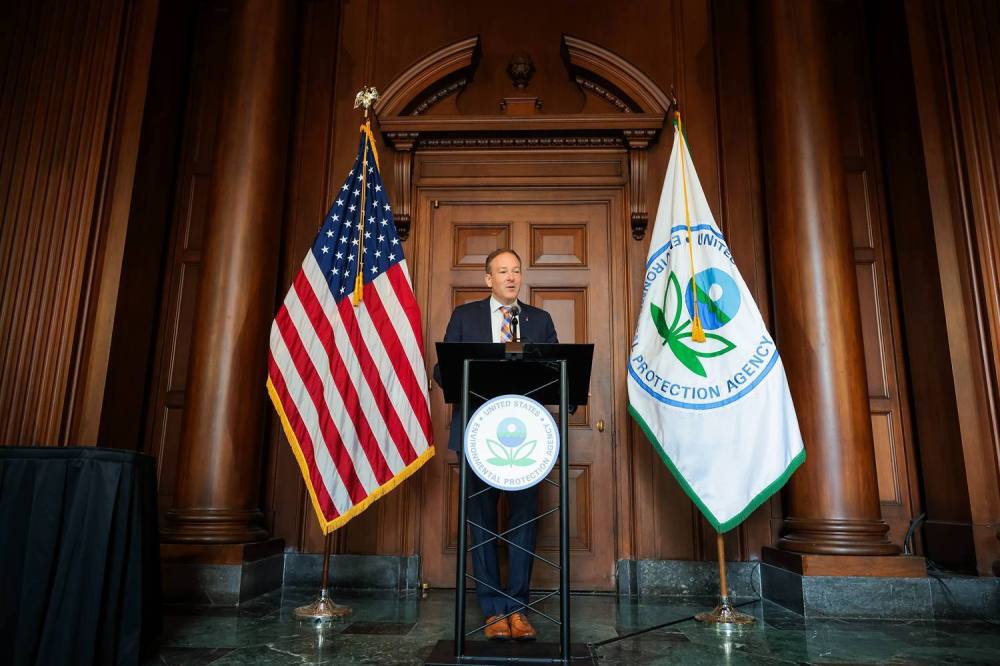Even as the world reels from the hottest year ever recorded, the Trump administration is taking unprecedented steps to make climate change denialism the foundation of its federal policy.
There is an overwhelming scientific consensus that climate change—which is fueled by human activity (mainly greenhouse gas emissions from actions like burning fossil fuels)—has made extreme heat and precipitation more intense and frequent, driving or amplifying the heat waves, floods, and hurricanes that have devastated communities across the United States.
Even as the world reels from the hottest year ever recorded, the Trump administration is taking unprecedented steps to make climate change denialism the foundation of its federal policy.
There is an overwhelming scientific consensus that climate change—which is fueled by human activity (mainly greenhouse gas emissions from actions like burning fossil fuels)—has made extreme heat and precipitation more intense and frequent, driving or amplifying the heat waves, floods, and hurricanes that have devastated communities across the United States.
Yet U.S. President Donald Trump has waged an all-out war on federal climate efforts, including by gutting climate research efforts, dismissing hundreds of scientists contributing to a flagship report, eliminating key regulations, and slashing hundreds of millions of dollars in funding for renewable energy projects.
At the center of Trump’s blitzkrieg is a rejection of climate science itself.
Trump has claimed that climate change is a “hoax”; Agriculture Secretary Brooke Rollins rejected it as “crud” in May. Lee Zeldin, the administrator of the Environmental Protection Agency (EPA), has dismissed what he has referred to as “the climate change religion.”
On Aug. 4, Energy Secretary Chris Wright was the latest to repeat such claims. “The ceaseless repeating from the media, politicians and activists claiming that climate change is making weather more dangerous and severe is just nonsense,” he said in a post on X. “That is just NOT true.”
Wright’s misinformation comes just days after Zeldin announced that the EPA aims to overturn the landmark “endangerment finding” that determined that greenhouse gases threaten public health. That scientific determination formed the legal basis for a range of climate regulations, including ones imposing limits on car and power plant emissions.
Zeldin has hailed the proposed move as “the largest deregulatory action in the history of America.” “There are people who, in the name of climate change, are willing to bankrupt the country,” he said in a podcast interview. “They created this endangerment finding and then they are able to put all these regulations on vehicles, on airplanes, on stationary sources, to basically regulate out of existence, in many cases, a lot of segments of our economy.”
The proposal sent shockwaves across the scientific community, sparked sharp criticism from climate research groups, and is certain to trigger a fierce legal battle.
“Repealing this provision will have vast impacts on Americans’ lives: it will make it harder for people to deal with rising household energy bills, harder to address health problems from extreme heatwaves, and harder for businesses to succeed in a changing climate,” World Resources Institute U.S. director David Widawsky said in a statement. “Decades of EPA’s own science demonstrate that managing greenhouse gases is fundamental to protecting Americans’ health.”
To justify its efforts to revoke the endangerment finding, the Trump administration has cited a 151-page Energy Department report that was published hours after the EPA’s initial announcement and is written by four scientists and one economist—all of whom are known skeptics of the scientific consensus on climate change. The report has been criticized by scientists for cherry-picking information and misrepresenting and distorting findings.
The Trump administration’s embrace of climate change denialism comes as China races ahead in the clean energy boom, pushing forward with tens of billions of dollars of exports of lithium-ion batteries, solar panels, and electric cars. Last month at the European Union-China Summit, Beijing and Brussels promised to enhance climate cooperation—a rare bright spot in what has been a tenuous relationship.
The United States, EU, and China are among the world’s biggest greenhouse gas emitters, and the United States was the clear elephant in the room in the EU and China’s joint statement.
“In the fluid and turbulent international situation today, it is crucial that all countries, notably the major economies maintain policy continuity and stability and step up efforts to address climate change,” they said.




